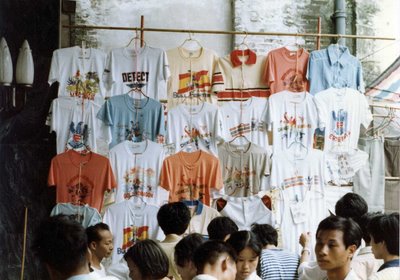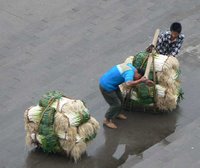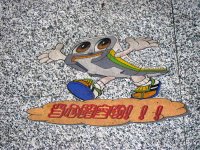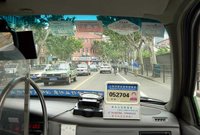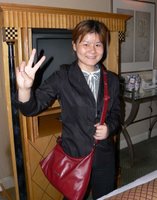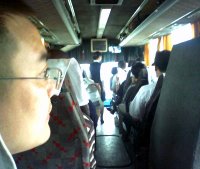
Sichuan Province is famous for hotpot. To eat hotpot you sit at a table with a large burner in the center that heats spiced oil with floating chilies. You order the ingredients and then cook to taste, being sure to dip into a bowl of garlic flavored chilified oil before putting your chopsticks into your mouth. Or, if you're a spice wimp like me, they'll float a smaller pot of boiling water in the boiling oil. The water for my dinner contained a small whole fish, scallions, some small bean-like fruits and various spices. I ordered some small mushrooms, bean curd skins and some other vegetable that I had never seen before. I was told that the menu was in English and technically it was. I passed on "cow spinal column" and I almost ordered "American tender boot" just so I could see what it was. The menu was full of English that had been massacred, sliced, diced, pureed and heavily spiced. Since it was dark and I was only out cruising for dinner I didn't have my camera.
Chengdu is full of fractured English, even Helen Keller could find examples of Chinglish here. Why someone would call a clothing store "Lesbian and the Life" is beyond me, just like the guy who sat at the table next to mine at the hotpot restaurant wearing a T shirt that said, "Jew Jeans" or the man out for a walk with his wife and their one government approved child wearing a black T-shirt that said, "Glitter Bitch". I've taken a few pictures of it but to take many more would be pointless, it's everywhere. The locals must think that it's cool otherwise why would they bother?
The Chinese hotels that I've stayed at before were a step up from the old commie era hotel where I'm staying now in Chengdu. They would cater to western palates with coffee, eggs and other breakfast items that we pampered westerners prefer. There wasn't even the pretense of western breakfast this morning. No coffee but I did have my choice between hot milk and a hot white fluid that I think tasted like soybean milk. There were also 3 different kinds of congee, some cookies, spicy salted beans, heavily salted peanuts and various fried buns and vegetables. I also ate something that was vaguely chowfun-like. Nothing was labeled in any language. I'm not sure what it all was but an hour later I was alternating between thinking that it was pretty good and wanting to hurl. I think it was all the oil, they're big on oil here and I have a low oil threshold. There must be some kind of edict handed down from the Communist Party in Beijing that all food consumed in Sichuan Province must be fried or at least passed through some oil, preferably chili infused oil I seem to be the only Westerner who stumbled into this hotel. For less than Motel 6 prices I'm getting a slightly run down commie era hotel. If there's A/C here it ain't working. Some of the hutong roofs are strewn with rubble, during the night someone decided to loudly shovel some if it. Perhaps it was done on one side and needed to be turned. To get hot water turn the sink spigot to the left, the shower control to the right (even though the left of the control says HOT in English). No fridge, no safe.
The people in town have pondered me a bit as I passed by but very few have shouted "Hello" or "lauwai" but I did attract the attention of the local pimps who had access to girls who could show me a massagy good time. I must look like a high roller. The hotel staff though speaks no English and when I arrived they treated me as if I had just emerged from a flying saucer. The mattress is the typical Chinese sheet of drywall. Internet connectivity here makes me long for the good old days when I had dialup. I'd like to send pictures but my LAN connection chokes on anything bigger than text. But it's nice to know that some things in life can be depended upon, I'm somehow still getting all of my spam. There's a wireless router hiding being an Intel Centrino ad at the front desk, I may go down there and lurk for awhile if it's not just for show because I can't pick it up in my room.
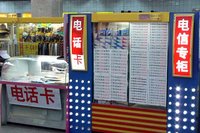
This afternoon I did a deal with one of the two government owned phone companies. At least I think I did. I was walking though a part of town that seemed to specialize in cell phone stores. Some people sat on the sidewalk selling old cell phones, others kept trying to hand me 8.5 X 14 pieces of paper filled with columns of numbers. They looked like large bookie sheets. Then it dawned on my tiny pea brain, they were selling cell phone numbers. Since I've learned that under the New Communism everything is negotiable I turned down a cell phone number at 100 Yuan (about $12.50). We bargained via calculator and settled at 50 Yuan but when he tried to add in an extra 30 I walked away. I may look funny but that doesn't means that you can take advantage of me. A woman who had been watching the deal go sour approached me and indicated that she'd do the deal for 50 Yuan. I agreed but she wanted me to chose a phone number. Fung Shui? They're temporary telephone numbers, they're all the same to me. She took me down a grimy alley filled with used cell phones and dealers, she took me right to her Mr. Big, the phone pimp. Mr. Big looked about 16 but he spoke some English. He assured me that I could call the USA. He recorded my number and who made the sale and I was back out on cell phone street. Seeing that I had no idea how to use my new service I stopped in at my new phone company, China Unicom. More language problems. They said that I could not call overseas until they recorded all of the information from my passport and then I had to wait 24 hours. Bureaucracy? Secret police? I agreed. The people with the sheets of phone numbers kept coming into to the phone company to try to sell the phone company's telephone numbers to it's customers. Maybe it's just business. And under the New Communism business cannot be stopped. When I was in Dandong in November I bought a SIM for my cell phone from a street vendor, no Mr. Big involved. The street vendor never told me about checking in with the phone company, probably because she didn't speak English. After I got home I read that the Chinese government had put a stop to such street sales citing security concerns. And while China Unicom did record all of my information (my papers were in order) it was only for the green light to place overseas calls. I was free to use the card within China before I voluntarily visited the phone company.
While walking around this morning I bought yak milk. Why did I buy yak milk? Because I could, that's why. I bought a 250 ml box of the stuff, I may bring it home if I can figure out a way to keep it from rupturing inside my luggage. It's not every day that one can buy a box of yak milk. When I'm walking the streets vendors are constantly trying to hand me advertisements, for what I don't know. I usually point to the Chinese printing, then to my eyes and shake my head, pantomime for I CAN'T READ so your ad is wasted on me. It usually works.

I just went to the lobby and tried the wireless, my laptop reads it loud and clear. Unfortunately it's hooked up to the same sorry Internet connection I have in my room so it doesn't work. Or it does work, but only with Chinese web sites. http://www.google.com.cn/ works fine, http://www.google.com/ is dicey. All the guys on the hotel staff come over and played with my laptop, which I'm convinced is just fine. And Hotmail won't come up on my laptop or their PC in their business center, which makes me suspect the heavy thumb of the government. This hotel has some odors that I've never experienced before and now it's going to have some more. When I was on my way downstairs to try the wireless I noticed that the entire hallway on this floor, except for maybe 20' around my room, the carpet was covered in sheets. The sheets squished and darkened when I walked on them. I could hear a woman sobbing loudly in a utility closet while others tried to comfort her. I'm not sure what happened but it can't be good.

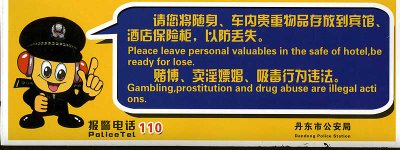 I get it, leave valuables in the hotel safe or they could get stolen. Or, “be ready for lose”.
I get it, leave valuables in the hotel safe or they could get stolen. Or, “be ready for lose”. 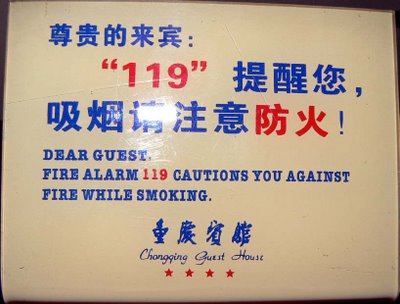 Every blog on China seems to have some obligatory Chinglish and it would be bad ju-ju for me to upset this tradition. As for just what Chinglish is check out Wikipedia's extensive entry Many humerous examples here: http://www.engrish.com/ There's no need to hunt down Chinglish in China, it's everywhere so it finds you. It's usually well meaning on the part of the writer and I still wonder why the Chinese think it's necessary to have English (or their own unique interpretation of it) everywhere. I'm glad that they do it, it means that I can read street signs and figure out where I'm going on the metro and get just a little bit less lost.
Every blog on China seems to have some obligatory Chinglish and it would be bad ju-ju for me to upset this tradition. As for just what Chinglish is check out Wikipedia's extensive entry Many humerous examples here: http://www.engrish.com/ There's no need to hunt down Chinglish in China, it's everywhere so it finds you. It's usually well meaning on the part of the writer and I still wonder why the Chinese think it's necessary to have English (or their own unique interpretation of it) everywhere. I'm glad that they do it, it means that I can read street signs and figure out where I'm going on the metro and get just a little bit less lost.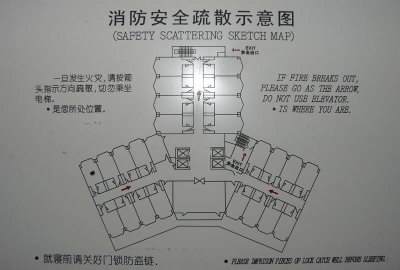
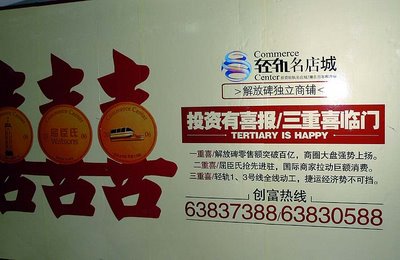 Like most Chinglish the true meaning can be grasped after some thought. I found this one outside of a monorail station in Chongqing. It shows 3 businesses that have done well in the shopping center by the monorail. So "Tertiary Is Happy" probably means that good things come in threes. Or not.
Like most Chinglish the true meaning can be grasped after some thought. I found this one outside of a monorail station in Chongqing. It shows 3 businesses that have done well in the shopping center by the monorail. So "Tertiary Is Happy" probably means that good things come in threes. Or not.
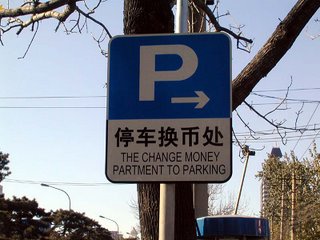
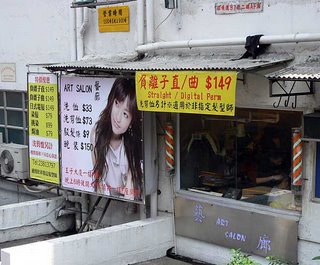
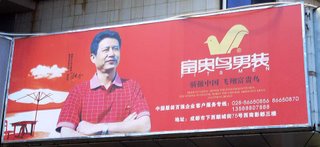 Check this guy out, I shot this billboard in Chengdu. The text says, "The strongest potential makes the Chinese arrogant Men's clothing brand". Change the word arrogant to confident and it suddenly makes more sense.
Check this guy out, I shot this billboard in Chengdu. The text says, "The strongest potential makes the Chinese arrogant Men's clothing brand". Change the word arrogant to confident and it suddenly makes more sense.
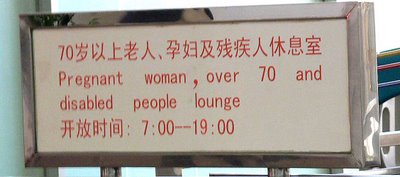
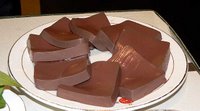

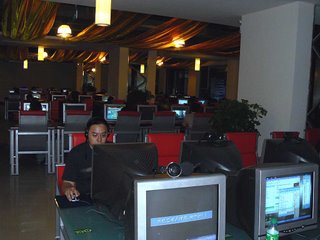 It was a large hot room filled with adolescent youth and and hot computer equipment. It was already a hot day and this place was on the 2nd floor of a mini-mall. It was uncomfortable but I had things to do, such as finding out why I couldn't reach my Hotmail account via my own laptop. The Chinese government never admits to censoring the Internet but supposedly that's just what they did to
It was a large hot room filled with adolescent youth and and hot computer equipment. It was already a hot day and this place was on the 2nd floor of a mini-mall. It was uncomfortable but I had things to do, such as finding out why I couldn't reach my Hotmail account via my own laptop. The Chinese government never admits to censoring the Internet but supposedly that's just what they did to 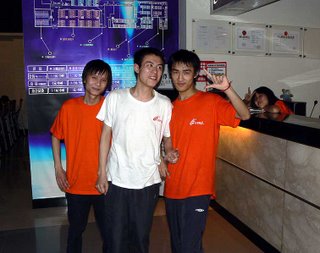
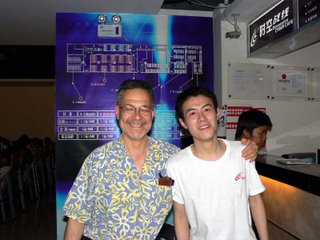
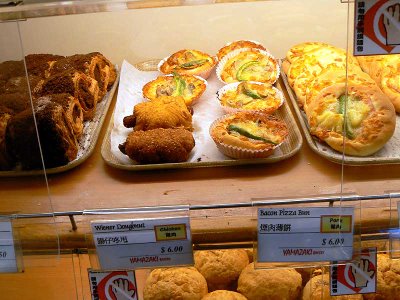
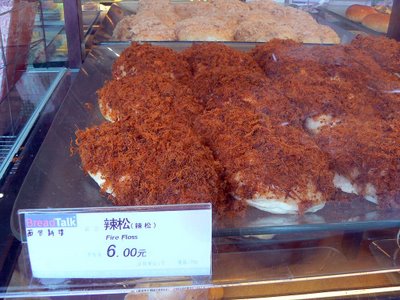
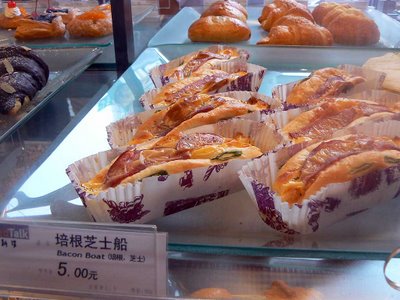
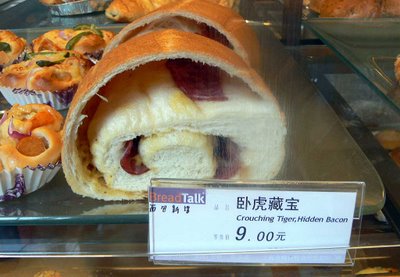
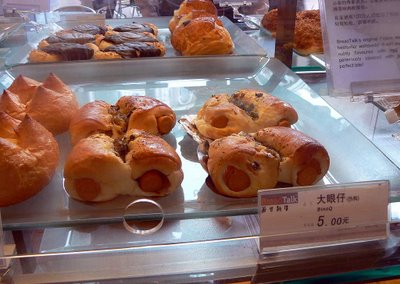
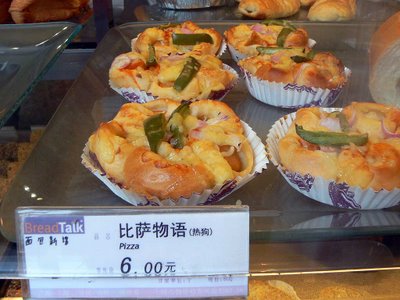


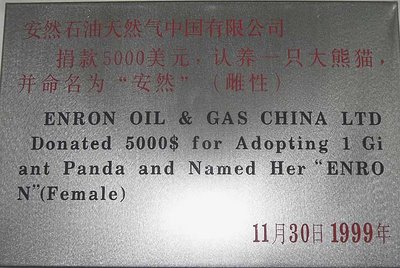
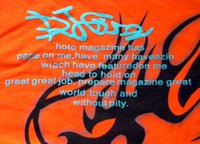
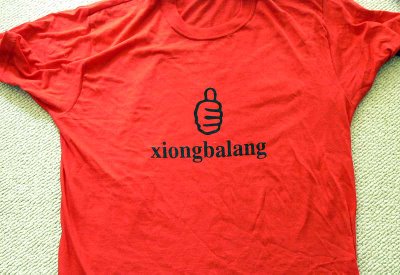
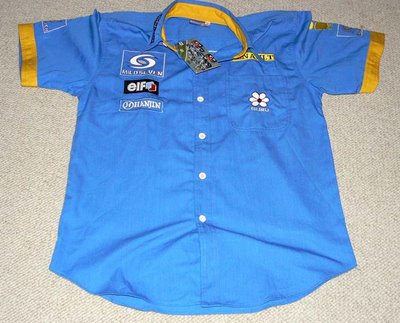
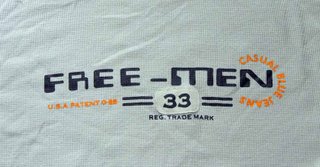 (Below) I took this picture in Guangzhou in 1982. Notice the English on most of the shirts.
(Below) I took this picture in Guangzhou in 1982. Notice the English on most of the shirts.